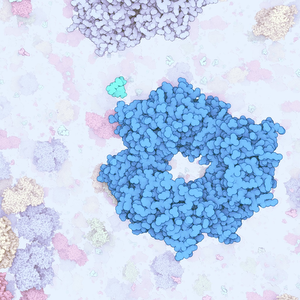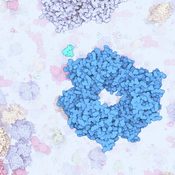Information
- Publication Type: Journal Paper with Conference Talk
- Workgroup(s)/Project(s):
- Date: June 2014
- Journal: Computer Graphics Forum
- Volume: 33
- Number: 3
- Note: Article first published online: 12 JUL 2014
- Location: Swansea, Wales, UK
- Lecturer: Mathieu Le Muzic
- Event: EuroVis
- Conference date: 9. June 2014 – 13. June 2014
- Pages: 141 – 150
Abstract
In this paper we propose a new type of a particle systems, tailored for illustrative visualization purposes, in particular for visualizing molecular reactions in biological networks. Previous visualizations of biochemical processes were exploiting the results of agent-based modeling. Such modeling aims at reproducing accurately the stochastic nature of molecular interactions. However, it is impossible to expect events of interest happening at a certain time and location, which is impractical for storytelling. To obtain the means of controlling molecular interactions, we propose to govern passive agents with an omniscient intelligence, instead of giving to the agents the freedom of initiating reaction autonomously. This makes it possible to generate illustrative animated stories that communicate the functioning of the molecular machinery. The rendering performance delivers for interactive framerates of massive amounts of data, based on the dynamic tessellation capabilities of modern graphics cards. Finally, we report an informal expert feedback we obtained from the potential users.Additional Files and Images
Weblinks
BibTeX
@article{lemuzic-2014-ivm,
title = "Illustrative Visualization of Molecular Reactions using
Omniscient Intelligence and Passive Agents ",
author = "Mathieu Le Muzic and Julius Parulek and Anne-Kristin Stavrum
and Ivan Viola",
year = "2014",
abstract = "In this paper we propose a new type of a particle systems,
tailored for illustrative visualization purposes, in
particular for visualizing molecular reactions in biological
networks. Previous visualizations of biochemical processes
were exploiting the results of agent-based modeling. Such
modeling aims at reproducing accurately the stochastic
nature of molecular interactions. However, it is impossible
to expect events of interest happening at a certain time and
location, which is impractical for storytelling. To obtain
the means of controlling molecular interactions, we propose
to govern passive agents with an omniscient intelligence,
instead of giving to the agents the freedom of initiating
reaction autonomously. This makes it possible to generate
illustrative animated stories that communicate the
functioning of the molecular machinery. The rendering
performance delivers for interactive framerates of massive
amounts of data, based on the dynamic tessellation
capabilities of modern graphics cards. Finally, we report an
informal expert feedback we obtained from the potential
users.",
month = jun,
journal = "Computer Graphics Forum",
volume = "33",
number = "3",
note = "Article first published online: 12 JUL 2014",
pages = "141--150",
URL = "https://www.cg.tuwien.ac.at/research/publications/2014/lemuzic-2014-ivm/",
}


 paper
paper video
video

